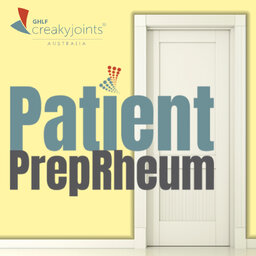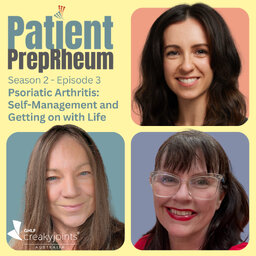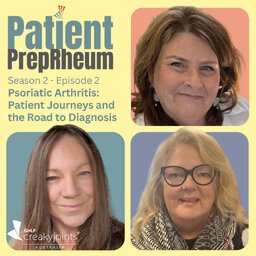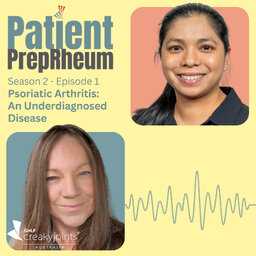Accessible Medication Through the TGA & PBS
In episode 2, Naomi talks with Janine Monty, who lives with multiple autoimmune conditions. Janine shares why having access to a large range of affordable medicine is key to her being able to manage her everyday life. Having to take 17 different medications, not all on the Pharmaceutical Benefits Scheme (PBS), Janine explains just how crucial the PBS is for her. We are also joined by Rheumatologist Paul Bird, who explains, in easy-to-understand terms, the important role the TGA and PBS plays and how patients can have a say in improving access to a medicine.
Dr Paul Bird Profile
Paul Bird has over twenty years’ experience in treating rheumatic disease, with particular expertise in Rheumatoid arthritis, Psoriatic arthritis and Ankylosing spondylitis. A/Professor Bird received his medical degree with Honours from the University of Newcastle, and he completed his physician and rheumatology training in Sydney. Pursuing research alongside clinical medicine and patient care, he completed a PhD in 2005 examining MRI in Rheumatoid arthritis, and a Graduate Diploma in MRI. He continues to undertake arthritis research with fellow Australian rheumatologists and with international colleagues.
He has held Staff Specialist roles at both St George Hospital and Prince of Wales Hospital and a visiting medical officer position at Griffith Base Hospital, where he managed a rural rheumatology clinic from 1999-2005. He continues to teach medical students and postgraduates as part of his commitment to medical education.
In addition to his clinical practice Dr Bird is the Director of Optimus Clinical Research, a facility dedicated to pursuing trials of the latest developments in rheumatology. Part of review boards for several large international medical journals, he spends time reviewing research and publications, keeping up to date with the most recent medical advances.
As part of his commitment to optimising rheumatology treatments, he is member of the OPAL group directorate, a dedicated group of clinicians pursuing exploration of better delivery of rheumatology care through clinician driven research.
Internationally recognised as a specialist in rheumatic disease and imaging, he is the current Chair of the International Magnetic Resonance Imaging Research association and actively participates in national and international rheumatology research.
HOST: Naomi Creek
PATIENT: Neen Monty
DOCTOR: Dr Paul Bird
I need these medications, some keep me alive, some make my life more comfortable, and some just make my life more convenient, but they’re all incredibly helpful. I’m really grateful I don’t have to choose, but without the PBS I wouldn’t be able to treat all my various health problems.
Hi I’m Naomi Creek, National Coordinator for Creakyjoints Australia, I’ve been living with Rheumatoid arthritis since I was 12 years old, so I appreciate the importance of having access to a range of medicines that I can afford to treat my disease.
In this episode of Patient Prep Rheum we’re uncovering the process of how medications are approved by the Therapeutic Goods Administration (the TGA), and from there, how patients can play a role in getting them listed on the Pharmaceutical Benefits Scheme (the PBS).
This is a process that can be complicated, however it is one that allows accessibility to medication, and also one that we, as patients, can influence.
We spoke with Rheumatologist, Dr Paul Bird, who explained the role of The Therapeutic Goods Administration in Australia.
The TGA is the body in Australia that looks after approving medications so they can be available to the general public, that’s a very important role.
So their job is to look at new products as they come through, look at the data that’s presented, and say is this effective, is this safe, is there a need for people in Australia to have this medication.
The information they are usually given comes from clinical trials, the TGA will look at all of the data and they’ll either say we are satisfied that this compound that you have developed is effective and safe on the data you’ve given us, we’re going to license it in Australia, or they’ll say no. No, there’s no clinical need for this medication.
Once a compound is listed by the TGA, it can be available to the general public, now here’s the catch, it’s available at the price the pharmaceutical company charges for it. So if a drug costs $40,000 per year, yes you can have it immediately, but you’re going to have to pay $40,000 per year if I write you a script.
As you can imagine this is not sustainable or affordable for most people. That’s why in Australia we have the Pharmaceutical Benefits Scheme (the PBS), which subsidises certain medications, which is critical for people like Neen Monty who has been living with rheumatoid arthritis for 15 years.
I take 17 medications that are on the PBS, every day. I take two medications that are not on the PBS, and one of them runs for $400 a month, and the other one is $80 a month, so without the PBS the medications add up really quickly.
Unfortunately for Neen, the costs of medication that aren’t on the PBS put financial pressure on her. She can continue to petition for these two medications to be approved on the PBS, however, for people living with a chronic disease this isn’t an easy process.
It is exhausting, because if you are under 17 medications, I’m not such a well person, I really don’t have that much energy so I really do have to pick my battles. Sometimes it feels like you shouldn’t have to fight so hard, this shouldn’t need to be this difficult.
I don’t even know what the process is, I know there’s the PBS advisory committee and they take submissions, and they advise the government, I don’t know what’s involved in what needs to be in the submission, if there was some sort of template as to what kind of information you need to gather, what sort of evidence you need to provide as to what kind of information you need to gather, what sort of evidence you need to provide
This is a confusing process that a lot of chronic disease patients rely on but don’t know a lot about. Dr Paul Bird explains the role of the Pharmaceutical Benefits Advisory Committee (PBAC).
To get onto the PBS a medication has to pass some very stringent tests, those tests are again, around making sure it’s effective, does it do the job it’s supposed to, making sure it’s safe and does no harm to the people it’ll be given to. Is it cost effective? This is a big thing, cost effectiveness. Is the cost of this drug going to give enough benefit to enough people to enable it to be listed on the PBS.
The Pharmaceutical Benefits Advisory Committee is the committee that sits in that room and confers on these issues, and they then advise the PBS as to whether the drug should be listed. All medications are open for comment, so that when a new medication is being submitted to the PBAC there will be a time when comments can be put in by clinicians and patients, and the PBAC will consider those comments. It is sometimes difficult to be aware of when these things are happening, they are generally publicly listed on the Government websites when they are open for comment.
Sometimes it’s not just about the stats, it's about the experience that individuals have had with different medications, so there’s power in those voices as well.
So it’s a difficult process, and necessarily difficult, because we’ve only got so much in the health budget pot, and the problem is if we let every drug onto the PBS, then we have no money left.
So we have to be careful. We have to say ok we only let the medications on where we see the greatest benefit, and the greatest safety, and cost-effectiveness for the majority of people.
There are other ways patients like Neen can raise their voice to get medicines put onto the PBS.
Their local member is not a bad person, writing to their local member and expressing their frustrations in regards to medicines. Usually they’re the sort of person who has to reply if they get a written correspondence, and if they get it from a lot of people, they start to do something.
Some people find this an easier option as Federal MP’s can support your request by directing your concerns to the relevant officials.
You can also take your comments directly to PBAC, their agenda is published on the PBS website 14 weeks before their meeting. Patients can submit comments on the medications up for approval for up to eight weeks, by filling in the information sheet found on the PBS website.
It’s crucial that patients play an active role in the PBS. Because if it didn’t exist, Neen wouldn’t be left with many choices.
It would be a matter of prioritising the medications. There are the ones that literally keep me alive, there are ones that improve my quality of life, manage pain, that sort of thing, and there are ones that just make life easier.
My hydrocortisone, if I don’t get that, I will die. I would die pretty quickly without that. Without my thyroid medication I would die really really slowly. Without my rheumatoid arthritis medication I would be lying in bed, crying and having a really miserable life. I wouldn’t be able to get up and move around, I would need a whole lot of help. Same goes with my pain medications.
I’m really grateful I don’t have to choose, but without the PBS I wouldn’t be able to treat all my various health problems.
The Therapeutic Goods Administration (the TGA) and the Pharmaceutical Benefits Scheme (the PBS), are essential in the Australian healthcare system to keep safe and affordable medications on the market.
To learn more about the TGA and the PBS, be sure to listen to our audio guide. If you need guidance making a submission to the PBAC get in touch at creakyjoints.org.au, and remember, your small changes can have a big impact.
 Patient PrepRheum
Patient PrepRheum


